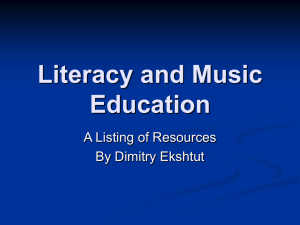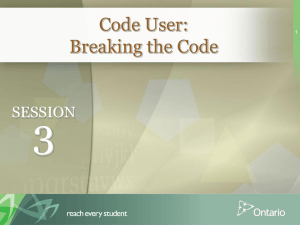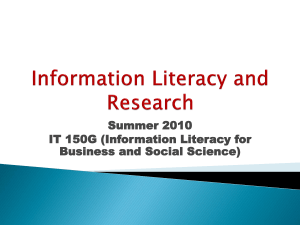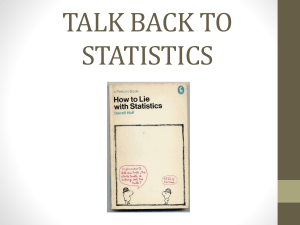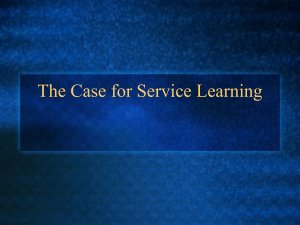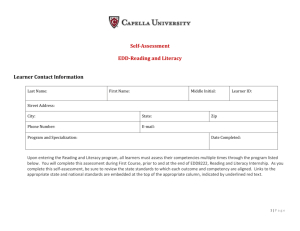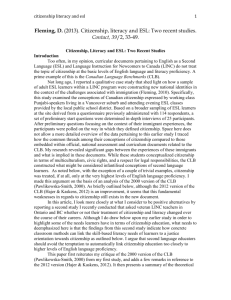Prioritizing Learning Needs for Beginning ESL Students
advertisement
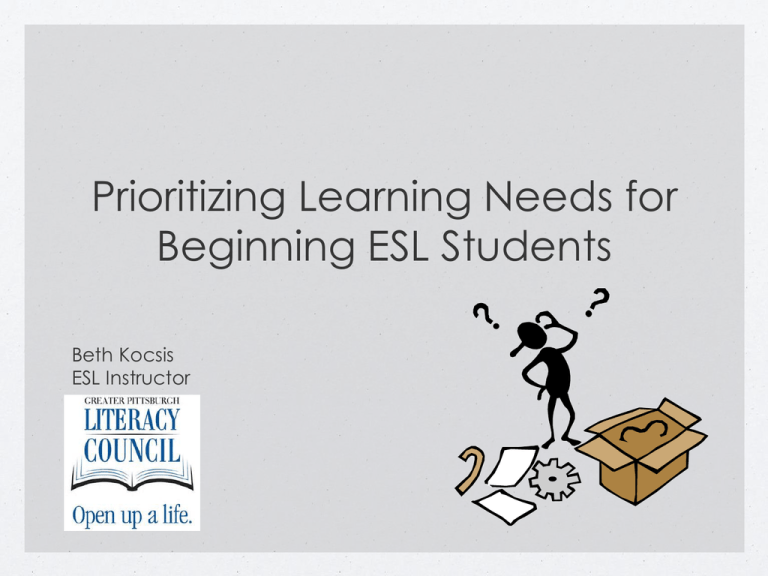
Prioritizing Learning Needs for Beginning ESL Students Beth Kocsis ESL Instructor Introductions • “Nice to meet you!” • Tell us one piece of language (phrase, social exchange) that you say every day. 2 Beginning Literacy Goals Citizenship Functional Literacy High Priority Learning Life Skills and ‘extras’ School Skills 3 Glossary of Terms Definition Example Pre-literate learner The native language does A Bantu refugee from Somalia not yet have a writing knows her native Af-Maay only system (oral society). orally, as a written form of the language is just now being developed. Non-literate learner The native language has a written form, but the learner has no education and no access to literacy instruction. An older Bhutanese farmer has now moved to the US as a refugee. Semi-literate learner The learner has minimal literacy in native language. Roberto attended a rural school in El Salvador for 3 years. Although he wanted to continue, his family needed him to work on the family farm. 4 Beginning Literacy ESL 5 Beginning Literacy ESL 6 Class Ideas Dialogues/Conversation Citizenship ►Social exchange ►Differentiating levels ►Personal information questions ►Civics, reading and writing ►The ‘interview!’ Beginning Literacy ESL Priority English Life Skills ►Money ►Time ►Numbers ►Stories ►Parent Education ►Functional literacy 7 “Let’s start at the very beginning…a very good place to…start”? The case for not starting at the alphabet What skills are necessary for students to read and write one word? 8 Teaching School Skills • Class Norms: On time/late, cell phone use, planned absences, being prepared for class • Watching TV for school closings! • Learning activities: Circle, listen, repeat, match, underline 9 Dialogues/Conversation Social exchange ►How are you’s? Nice to see/meet you! Have a nice weekend! ►How’s the weather? ►Excuse me’s... Personal information questions ►Where are you from? ►Where are you living now? ►How long have you lived in Pittsburgh? Do you like living in Pittsburgh? 10 Priority Learning: The Calendar Minimum Competencies • Today/yesterday/tomorrow/day before yesterday/day after tomorrow • Distinguishing day vs. date • Next week/this week/next week For higher level students… • Ordinal number accuracy • Recognizing months and corresponding numbers • Day/month abbreviations • “Next Monday is...” “Last Friday was...” o Next week Last week o Contextualized numeric dates (appointment cards, expiration dates, birthdays) o Ago/in 11 Priority Learning: Time Minimum Competencies • On time/early/late • ‘Before/after’, ‘Every day’ • Awareness of counting by 5’s • Proficiency with counting by 5’s • Answering questions (when do you get up, eat lunch, go to bed) • Awareness of am/pm • Reading digital clocks For higher level students… • All middle level activities + different ways of expressing time (’25 after,’ ‘quarter after’ ’25 to,’) • Once/twice a day/week/month • Reading digital and analog clocks 12 Priority Learning: Numbers Minimum Competencies • Recognizing #1-50 in and out of sequence • Recognizing number 1- 100 • Writing dictated phone numbers • Orally giving their phone numbers For higher level students… • All middle level competencies + recognizing and saying numbers through 10,000 • Phone numbers (writing and reading with proper pronunciation and pacing) • SSN 13 Priority Learning: Money Minimum Competencies • Coin recognition • Prices under $5.00 • Making correct money amounts with change • Counting money with bills and coins • Orally and writing prices to $500.00 • Money concepts (less than, more than, most, least) • Shopping concepts (each, per pound) For higher level students… • All middle level competencies + money concepts - going shopping • Change (too much, not enough) • Rounding to the nearest dollar 14 Life Skills 15 Teaching Syntax & Vocabulary Through Life Skills Stories • The Goal • The Process • The Stories 16 Functional Literacy 17 Functional Literacy Skills • Whole/sight word recognition • Spell and write first and last name • Monthly calendar • Address work – memorize and recite it orally • Birthdays (their own and family members) • Phone Number • Abbreviations - SSN, Phone #, DOB 18 Citizenship Test Writing Reading Speaking Interview Civics based on N-400 19 Extra Learning Opportunities • LEARN Bus • Volunteer Opportunities • Field trips 20 21


